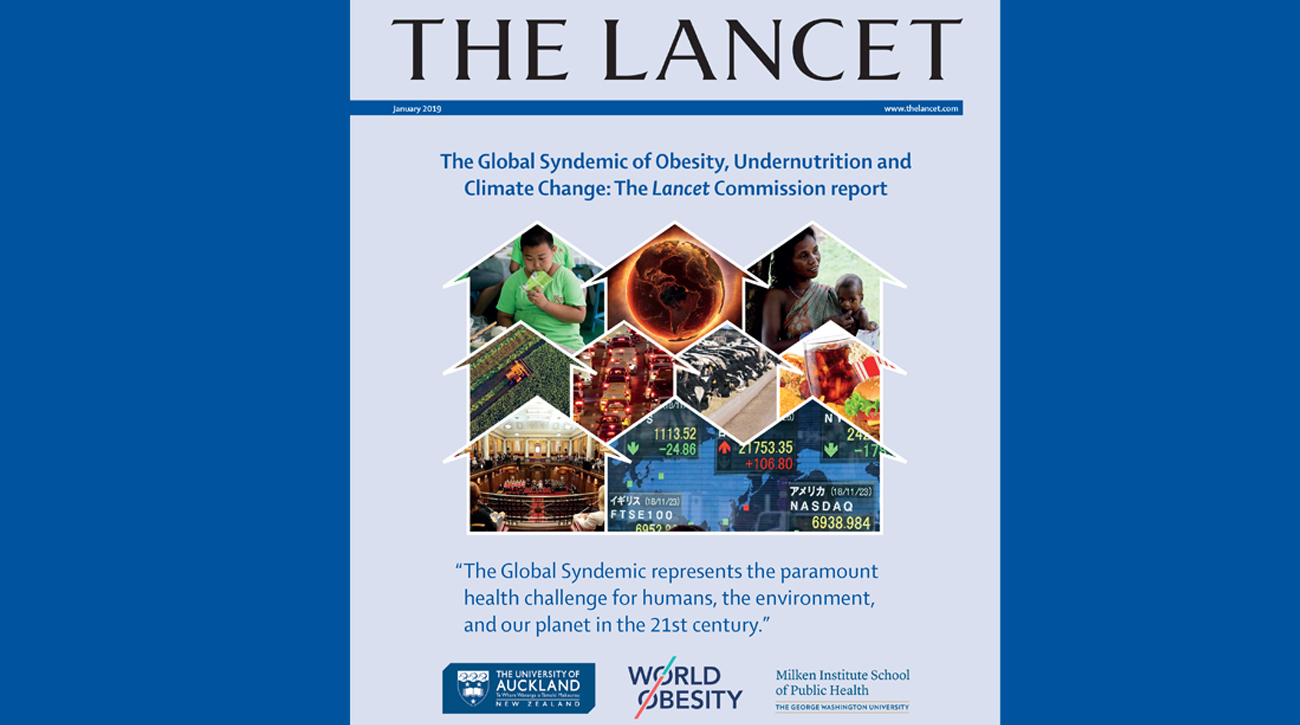WASHINGTON, DC (Jan. 27, 2019) – Leaders must take a hard line against powerful commercial interests and rethink global economic incentives within the food system in order to tackle the joint pandemics of obesity, undernutrition and climate change, according to a new report by The Lancet Commission on Obesity.
Led by the George Washington University, University of Auckland in New Zealand, and the World Obesity Federation, The Lancet Commission is the result of a three-year project led by 26 experts from 14 countries. William Dietz, MD, PhD, chair of the Sumner M. Redstone Global Center for Prevention and Wellness at the George Washington University Milken Institute School of Public Health (Milken Institute SPH), co-chaired the Commission, and Michael Long, an assistant professor of prevention and community health at Milken Institute SPH, served as a fellow on the Commission.
The new Commission defines ‘The Global Syndemic’ as the global interactions of the pandemics of obesity, undernutrition and climate change, which are linked through common drivers and shared solutions. Driving The Global Syndemic are food and agriculture policies, transportation, urban design and land use systems, which in turn are driven by policies and economic incentives that promote overconsumption and inequalities. Double- or triple-duty actions can address the underlying societal, political, socio-economic, and commercial drivers of The Global Syndemic, according to the Commission.
A key recommendation from the Commission is the call to establish a new global treaty on food systems to limit the political influence of the food industry. The establishment of a Framework Convention on Food Systems (FCFS) - similar to global conventions for tobacco control and climate change – would restrict the influence of the food industry in policy making and to mobilize national action for healthy, equitable and sustainable food systems.
“Although food clearly differs from tobacco because it is necessary to support human life, unhealthy food and beverages are not. The similarities with Big Tobacco lie in the damage they induce and the behaviors of the corporations that profit from them. A Framework Convention on Food Systems would help empower individual nations against vested commercial interests, redirect the vast subsidies that currently benefit unhealthy industries, and provide full transparency,” Dietz said.
A new FCFS would explicitly exclude the food industry from policy development. Such a commitment would recognize the fundamental and irreconcilable conflict that exists between some food and drink industries’ interests and those of public health and the environment. All parties must be transparent and accountable when dealing with industry or working to further their interests, and no fiscal advantages or inducements to produce food and beverage products that damage human and environmental health should exist.
Over the past two decades, obesity, undernutrition and climate change have been viewed as separate domains, and policy responses have been unacceptably slow due to reluctance of policy makers to implement effective policies, powerful opposition by vested commercial interests, and insufficient demand for change by the public and civil society. Undernutrition is declining too slowly to meet global targets, no country has reversed its obesity epidemic, and comprehensive policy responses to the threat of climate change have barely begun.
The new Commission identifies a number of double- and triple-duty actions that address multiple parts of the Global Syndemic, which are easily available through a policy brief intended for national and municipal governments, civil society, funders, businesses, and international agencies. Triple-duty actions, which would impact obesity, undernutrition and climate change, include guidelines for a sustainable diet, the restriction of commercial influences, the right to wellbeing legislation, and policies for healthy, equitable, environmentally sustainable, economically prosperous food systems. Additional examples include reducing red meat consumption through taxes, redirected subsidies and labels that reflect sustainability; and supporting active transportation through infrastructure, taxes, and subsidy shifts. Triple-duty actions also include social marketing strategies that would lead to obesity prevention through increased physical activity and less sedentary time, cheaper transport access to healthy food and employment, potentially reducing poverty and undernutrition, and lower GHG emissions from transportation.
Effective strategies to address the Global Syndemic will be unlikely to succeed without a broad base of support. In Mexico, mobilization of citizens was crucial in passing a tax on sugar-laden beverages. Despite resistance from the beverage industry, Mexico passed a 10 percent tax. Within two years, consumption of sugary drinks in Mexico was reduced by 7.6 percent. The Commission calls for $1 billion from philanthropic and other sources to support 100 countries to apply Mexico’s approach to implement food and nutrition policies.
The Lancet Commission on Obesity was formed following the publication of two Lancet Series on Obesity in 2011 and 2015. The Commission aims to stimulate action on obesity, strengthen accountability systems for the implementation of agreed recommendations to reduce obesity and its related inequalities, and develop new understandings of the underlying systems that are driving obesity in order to develop innovative approaches towards making those systems less obesogenic. Boyd Swinburn, MD, a professor of population nutrition and global health in the School of Population Health at the University of Auckland, co-chaired the Commission.
“The Global Syndemic of Obesity, Undernutrition and Climate Change: The Lancet Commission report” was published online Jan. 27.
Additional Resources:
Read the Policy Brief on the Global Syndemic here.
Listen to The Lancet podcast on the global syndemic here.
Watch the video on the reports findings here.


